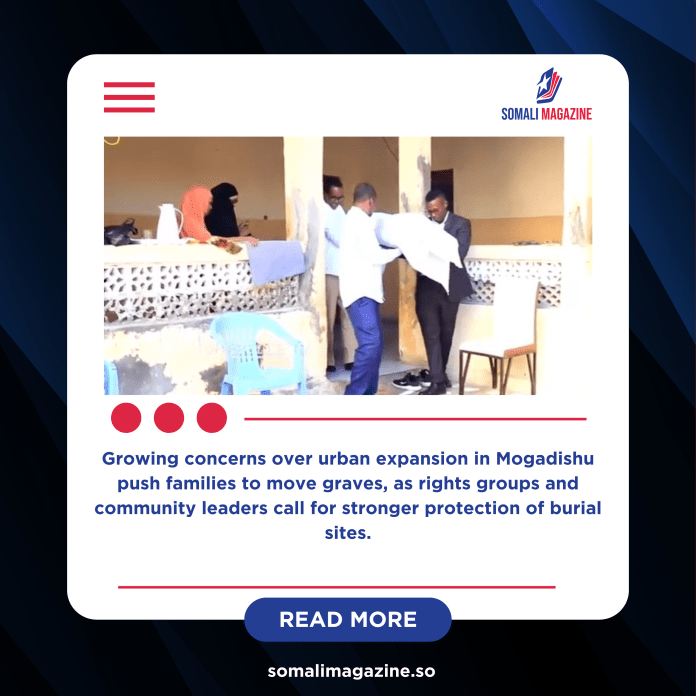Facebook Twitter (X) Instagram Somali Magazine - People's Magazine
A Somali family has taken the painful step of exhuming and re-burying the remains of their parents, worried that the cemetery where they had been laid to rest could soon be destroyed to make way for urban development.
The couple had originally been buried seven years ago at Moalim Nur cemetery on the outskirts of Mogadishu. But with growing concerns that burial sites in the capital are increasingly at risk, relatives decided to move the remains to Guriel, in the Galgaduud region. The reburial was carried out according to Islamic traditions and attended by family members and community elders.
Relatives described the process as deeply emotional. They said disturbing the graves of their loved ones was heartbreaking but necessary to protect them from future destruction.
Fear Rooted in Past Demolitions
Their decision was influenced by events in 2024, when authorities cleared the Policia (Bulusia) cemetery in Mogadishu. Families were forced to exhume the bodies of their relatives after a government directive ordered the site to be vacated. No clear explanation was given, and soon after, bulldozers flattened the cemetery.
That site was the resting place of several well-known figures, including comedian Abdi Muriidi Dheere, popularly known as Ajakis, and former Mogadishu mayor Abdirahman Omar Yarisow, who was killed in a 2019 bombing. The demolition sparked widespread anger. Families of the dead said they were traumatized, while religious leaders condemned the act as a violation of Islamic teachings and Somali cultural traditions. Many saw it as a sign that the government was failing to respect the dignity of the deceased or the feelings of grieving families.
Growing Pressure on Cemeteries
The recent reburial in Guriel has brought renewed attention to the wider problem facing cemeteries in Mogadishu and other Somali cities. As the capital expands rapidly, land has become highly contested. Burial grounds, once considered sacred and untouchable, are increasingly threatened by urban development, private land disputes, and weak legal protections.
Community members say this situation has created constant fear among families. People worry that graves could be disturbed without warning, forcing them into the painful process of relocating their loved ones’ remains. For many, the uncertainty adds to the trauma of loss.
Rights groups argue that the repeated destruction of cemeteries not only hurts families but also undermines public trust in the government. “When the resting places of the dead are not respected, it sends a message that ordinary people’s rights and traditions are not valued,” one activist explained.
Calls for Stronger Protection
Civil society organizations and religious leaders are now urging the Somali government to put in place stronger safeguards to protect burial grounds. They argue that cemeteries should be preserved as part of both cultural heritage and spiritual duty.
Islamic scholars stress that disturbing graves without a compelling reason goes against religious principles. They have warned that unless the government takes steps to protect cemeteries, it risks alienating the public and worsening mistrust.
Families across Mogadishu say they want clear laws and guarantees that grave sites will not be cleared without proper consultation and justification. They also want the government to consider designating new burial spaces outside crowded urban areas to reduce pressure on existing cemeteries.
A Painful Choice
For the family that recently reburied their parents in Guriel, the move has brought some relief but also lingering sadness. They said they had never imagined disturbing their loved ones’ graves but felt they had no choice. “It was painful, but we did it to keep them safe,” one relative explained.
Their story reflects the growing challenge faced by many Somali families today—balancing the deep cultural and religious respect for the dead with the harsh realities of a rapidly changing city. Unless stronger protections are introduced, more families may be forced to go through the same painful decision of moving their loved ones, turning grief into an even heavier burden.

